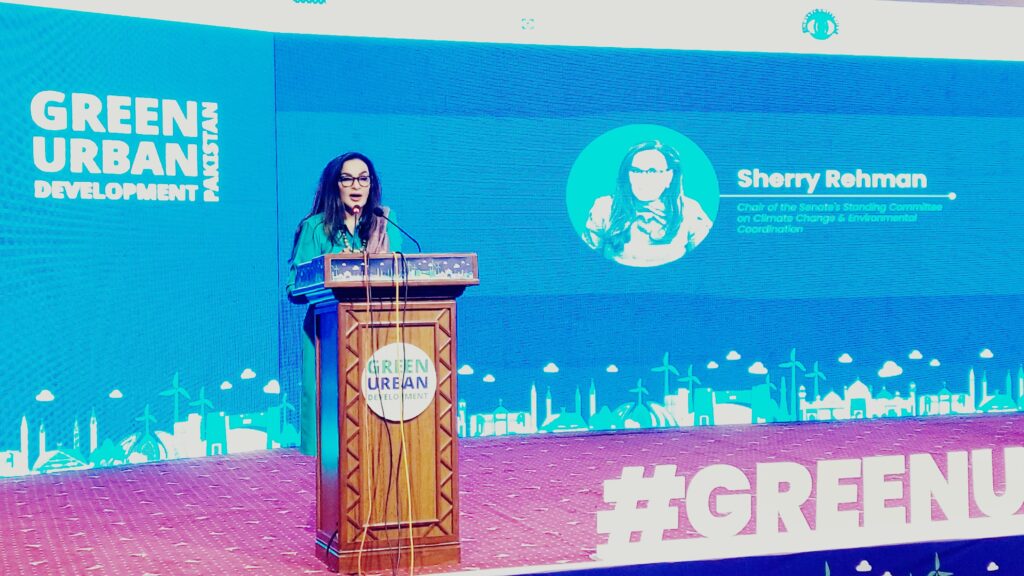
Pakistan’s Energy Crisis Stems from Inefficiency, Not Emissions.
Lahore : Senator Sherry Rehman delivered a compelling address as Chief Guest at the Asia Energy Transition Summit at LUMS, stressing the urgency of accelerating energy transition and implementing Pakistan’s Nationally Determined Contributions (NDCs). Senator Rehman outlined the existential threat posed by climate change and highlighted Pakistan’s commitment to achieving 60% renewable energy by 2030 as part of its NDCs.
“Climate change is not just another policy issue—it is the most existential crisis of our time,” stated Senator Rehman. “Countries like Pakistan, which contribute less than 1% to global emissions, are bearing the brunt of a crisis we did not create. Pakistan’s energy crisis is not stemming from our emissions, but from the inefficiency of our energy sector.”
Senator Rehman noted that, under the NDCs, Pakistan has set an ambitious target to produce 60% of its energy from renewable sources by 2030 and to reduce its projected emissions by 50%. “Achieving these targets will require us to transform our energy systems and modernize our outdated grid. We must attract international investments and implement consortium financing models to support this transition,” she emphasized.
Senator Rehman further elaborated on Pakistan’s energy mix and how dependency on fossil fuels has created systemic vulnerabilities. “The energy crisis we faced in 2022 when the LNG traders cancelled five tankers worth of LNG to Pakistan is a stark reminder of how we remain locked into predatory LNG markets. With fossil fuel prices escalating and the impacts of climate change intensifying, Pakistan must shift gears now. We have the capacity to become a regional leader in renewables if we can stabilize regulations and policies,” she said.
Senator Rehman highlighted Pakistan’s immense renewable energy potential, stating, “Our natural resources are a treasure trove for renewable energy. The Jhimpir Wind Corridor in Sindh, coupled with the abundant solar resources we possess, can unlock thousands of megawatts of clean energy. Yet, we are only at the beginning of this journey. Regulatory instability and a lack of contractual security have stifled investment in wind projects, while fortunately our solar industry has made significant strides.”
Referencing the import of 13 GW of solar panels from China, Senator Rehman discussed how net metering policies have already incentivized many households to adopt rooftop solar solutions. “We are witnessing a rooftop solar revolution, and the trend is spreading. It’s encouraging to see that even government institutions like the Parliament and the President’s House are now powered by renewable energy,” she added.
In her speech, Senator Rehman gave a historical perspective on the energy transition by referring to the early adoption of renewable energy in the United States back in 1979. “When President Jimmy Carter installed 32 solar panels on the roof of the White House, it was seen as a bold move toward sustainability. These panels were eventually removed by the Reagan administration, and ironically, one of them now sits in a museum in China—a country that is currently leading the global charge on renewable energy, with twice as many solar and wind projects under construction as the rest of the world combined,” she recounted.
China’s energy story, she explained, is one of early peaking and interconnected systems thinking, where energy is no longer viewed in isolation but as part of a broader strategy for national resilience and economic development.
“Pakistan must learn from these examples and embrace energy as part of an interconnected ecosystem,” she remarked.
Senator Rehman underscored that achieving Pakistan’s NDC goals will require addressing significant challenges in grid transmission and energy efficiency. “Our transmission system is outdated, with 16% transmission losses. It cannot support the new renewable capacity we plan to build. The age of large hydel projects like Mangla and Tarbela is over—they are not only costly but also face serious issues like over silting. The future lies in distributed renewable energy solutions,” she stated.
She emphasized the potential for renewable solutions in the agricultural sector as well, mentioning projects like biomass power plant in Faisalabad that can help reduce methane emissions. “Being an agricultural country, Pakistan has unique opportunities for renewable energy, especially through biomass and bioenergy. Yet, we need comprehensive policies and investments to unlock these opportunities,” she asserted.
Reflecting on the global context, Senator Rehman criticized the lack of focus on adaptation finance for countries in the Global South. “Energy transition summits are often glamorous showcases, but they lack meaningful commitments to adaptation. Small island states like the Maldives are on the verge of sinking due to sea-level rise, yet they are not major emitters. The international community needs to prioritize adaptation finance for these vulnerable countries,” she argued.
Senator Rehman concluded with a call to action: “Pakistan’s commitment to 60% renewable energy by 2030 and a 50% reduction in projected emissions is not just a national imperative but a global one. We must step up our efforts to modernize our grid, stabilize our regulatory environment, and create a conducive investment climate for renewables.”
The Asia Energy Transition Summit, attended by leading experts, policymakers, and academics, served as a platform for crucial discussions on decarbonisation, climate finance, and sustainable development. Senator Rehman’s address set the stage for a robust debate on how Asia, and Pakistan in particular, can lead the global energy transition.
